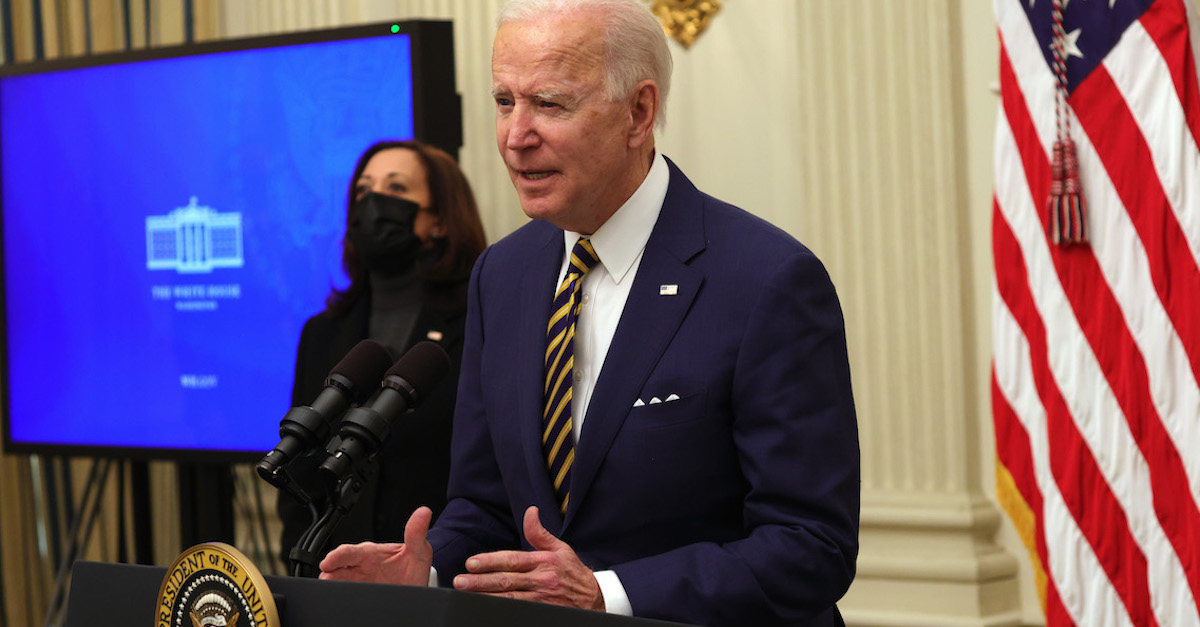
As individual states continue to take steps to eliminate qualified immunity for police officers who commit unconstitutional acts, the Biden administration has taken a different position regarding the highly controversial law enforcement protection tool.
In the first Supreme Court amicus brief submitted by the administration late last month, the Office of the Solicitor General argued in favor of taking a broad approach to applying qualified immunity in a Fourth Amendment controversy involving warrantless search and seizures.
The case, Caniglia v. Strom, began with a 2015 domestic argument between Edward Caniglia and his wife. Caniglia brandished an unloaded gun. His wife requested a wellness check from the police who determined Caniglia presented an imminent danger to the community and recommended he check himself into a hospital. He complied, but police then entered the home and seized all of his firearms and ammunition. Caniglia sued the officers involved, claiming the seizure violated the Fourth Amendment, but a district court and the First Circuit both found the officers’ actions fell under the Fourth Amendment’s “community caretaker” exception, reasoning that the officers didn’t exceed the scope of their responsibilities to care for the community despite the warrantless search and seizure.
In the Justice Department’s Feb. 18 amicus brief, the government argued that the lower court rulings should be upheld, but argued in the alternative that the officers should also be protected under the doctrine of qualified immunity.
Qualified immunity is a legal doctrine initially created by the Supreme Court that has steadily developed to prevent citizens from holding government actors accountable for constitutional violations enshrined in the Civil Rights Act’s §1983.
The modern doctrine holds that qualified immunity “shields federal and state officials from money damages unless a plaintiff pleads facts showing (1) that the official violated a statutory or constitutional right, and (2) that the right was ‘clearly established’ at the time of the challenged conduct.”
In order for such a right to be “clearly established,” however, the particular conduct of the alleged violator(s) must have previously been established – sometimes meaning an earlier case involving virtually the exact same set of facts to such an extent as to place the statutory or constitutional question beyond debate. This is a subjective and often too high bar for plaintiffs to clear.
“If any doubt exists about the reasonableness of the respondent officers’ actions,” the government wrote, “this Court should affirm on the alternative ground that the officers are entitled to qualified immunity.”
“No such clearly established law forbade the respondent officers from entering petitioner’s residence to address a suicide threat that, under all the circumstances, was specific, credible, and reasonably impending. Indeed, as noted, every court of appeals to have evaluated the constitutionality of similar police action has determined that the action does not violate the Fourth Amendment.”
In Congress, Democratic Sens. Ed Markey and Elizabeth Warren are joining Democratic Rep. Ayanna Pressley in introducing a bill to end qualified immunity on a national level. In a statement to The Intercept, Pressley said the doctrine “for too long has shielded law enforcement from accountability and denied recourse for the countless families robbed of their loved ones.”
“There can be no justice without healing and accountability, and there can be no true accountability with qualified immunity,” she added.
Read the administration’s brief below:
DOJ’s Caniglia Amicus Brief by Law&Crime on Scribd
[image via Alex Wong/Getty Images]